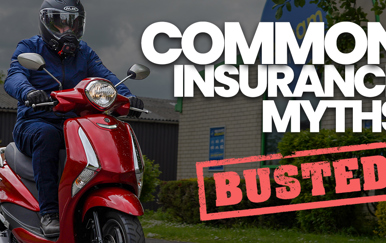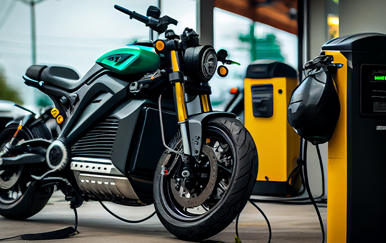With rush hour traffic and angry motorists to contend with, arguably commuting to work is one of the least enjoyable parts of our day. So why not take the stress out of your daily commute by switching to a motorcycle or scooter?
There’s no denying it, getting to and from work every day can be a real drag, which is why it’s no surprise that a report published by the Royal Society for Public Health has found that non-active commuting is detrimental to our health.
In this blog, we are going to be running down just ten of the positives of riding to work, so without further ado - let’s get into it, shall we?
10. Cheaper to run
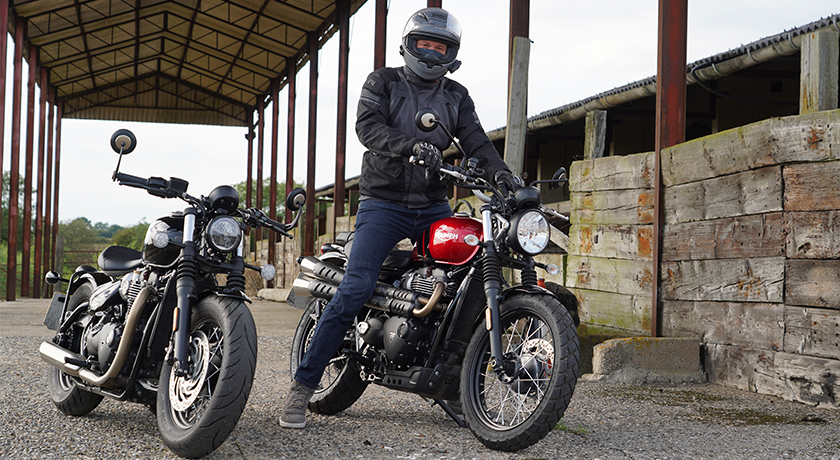
Kicking off our top ten benefits is arguably the best - opting for two wheels can save you a fair bit of money!
First things first, you can potentially pick up a second-hand motorcycle or scooter for far cheaper than you could a car. Upon research, you can pick up a second-hand scooter for just as little as £1,000 whereas when you compare that to a car you’re typically looking more towards the £2,000 mark.
However, it is not just the initial price of the two-wheeler you need to worry about, you will also need to take into consideration how much it is going to cost to keep it running. Costs such as insurance, MOT, and tax will have a massive impact on how affordable your mode of transport is for everyday use.
Road Tax
Whilst the actual amount you pay for road tax will depend on the engine size of your vehicle, motorcycle and scooter road tax tends to be car cheaper than if you were to tax a car.
For motorcycles (with or without a sidecar), the prices at the time of writing are:
| Engine (cc): | Single 12m Payment: | Single monthly payments (DD): |
| <150 | £24 | £25.20 |
| 151-400 | £52 | £54.50 |
| 401-600 | £80 | £84 |
| >600 | £111 | £116.55 |
*For more on motorcycle and scooter tax, head over to the official GOV.UK website!
MOT
According to the GOV.UK website, the maximum charge for a standard motorcycle to undergo an MOT will cost you £29.65 in comparison to the £54.85 charge for a car. Whilst there are some garages that will offer certain deals on these prices, these are the standard prices you would expect to pay across the board.
Insurance
Another cost to take into consideration is insurance. There are a variety of factors that can affect the cost of any insurance policy, such as the type of insurance coverage, the number of years no claims, vehicle storage, and security, and your age and location - however, some people find the cost is much lower to insure a scooter compared to cars, though this varies per individual.
Here at Lexham, we have written a fully comprehensive guide on how you get can cheaper motorcycle insurance to make your everyday commute just that little bit more cost-efficient!
9. Improved fuel efficiency

Onto the next benefit, and we have the potential for far greater fuel efficiency, meaning you’re ultimately spending less to fill up the tank!
When commuting on two wheels, not only will you be able to navigate yourself through traffic far easier than when in a car, but you could also be able to bring down your overall travel time meaning you’re using less fuel.
The miles per gallon is much higher on two wheels compared to four and according to Nimblefins, when taking into consideration both second-hand and newer petrol, diesel, hybrid, and electric vehicles, in 2023 the average car in the UK does around 38.3 miles to the gallon whereas the average motorcycle or scooter tends to get around 56.7 miles to the gallon.
8. Better for the environment
A study carried out by Green Choice found that commuting by motorcycle or scooter to work is far better for the environment than if you were to travel by car. Due to their smaller engines, riding a motorcycle or scooter to and from work can be a far more eco-friendly option for you to consider. Motorcycles can burn far less fuel than a car doing the same journey.
Not only are these small engines great for the environment, but the manoeuvrability of a motorcycle or scooter especially within more urban areas means you won’t get stuck in as much traffic, pumping out CO2 while stationary.
7. Riding has positive effects on your mental health
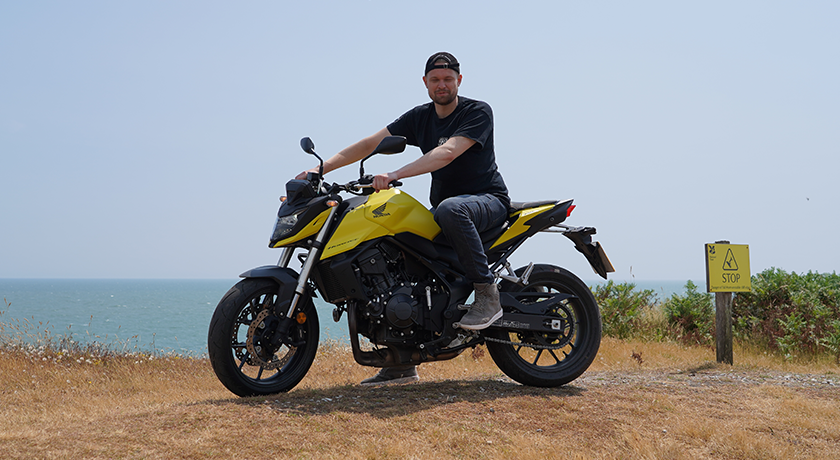
Many people out there who have been riding a long time will know just how much getting out on your bike can really help to improve your mental health. However, it isn’t just hearsay between the riders, there have been many studies carried out to research the correlation between riding and mental health.
According to a study carried out by a University of California (UCLA) neuroscientist Don Vaughn, after two weeks of 12-hour testing those who were riding experienced a calming aftereffect that lasted a short time after riding, as well as decreasing cortisol levels. On the other hand, those participants who drove couldn’t help becoming distracted and had a complete change in their mental state.
It goes without saying that commuting to and from work isn’t the best part of anyone's day by any means, however having the opportunity to be able to take control of the situation and help to enjoy it just that little bit more - why wouldn’t you take it?
6. Ideal for town and city riding
As you’ll most likely need to commute to work up to 5 days a week, then one of the most important things to consider is ensuring your ride is as stress-free and comfortable as possible.
When it comes to 50cc and 125cc motorcycles and scooters, not only are they great for first-time buyers, but they are also great for making handling easier thanks to their lightweight frames and lower power output.
Arguably, scooters are probably some of the easiest bikes to handle due to their nimble and easy-to-move-around traffic nature, getting you from A to B with ease. Scooters also tend to have a smaller wheelbase than motorcycles, making them easier to handle at slower speeds - so this is definitely one worth considering!
5. Parking a two-wheeler is easier (and cheaper)
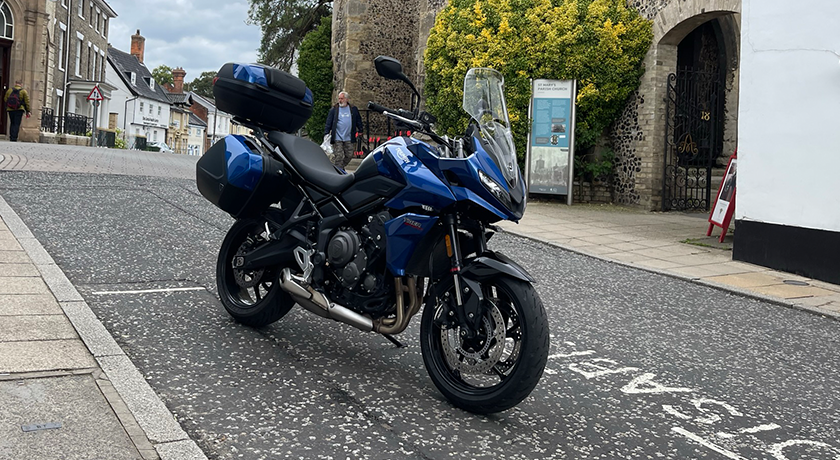
Car parks are one of the biggest headaches for motorists, trying to find a space for your car is hard work enough without the added cost of parking fees.
Luckily for scooter and motorcycle riders, parking up is a dream. Not only is it a lot easier to find a space to park your bike, but many councils and multi-storey car parks across the UK do not charge parking fees for two-wheeled vehicles, providing you park in the bays provided.
It is worth noting that not all pay and display car parks will offer free parking to motorcyclists so please ensure you check the signage or your local council website for more information on the matter.
4. Allows you to escape the crowds on public transport
Since COVID, I think many of us have realised just how much we enjoy our own personal space - in general, and not just for health purposes.
Personal space is something you often do not get the luxury of when traveling on public transport, whether it be the tube, train, or bus. There is no better way to escape the crowds than by jumping on a motorcycle or scooter, especially a 125cc.
Typically lightweight, affordable, and easy to ride, 125cc motorcycles and scooters are the perfect partner to take on your city commute. On the other hand, if your commute includes stretches of backroads or long jaunts at higher speeds (like on a motorway), a motorcycle larger than 125cc may be the ideal choice.
3. More road-friendly, especially in cities
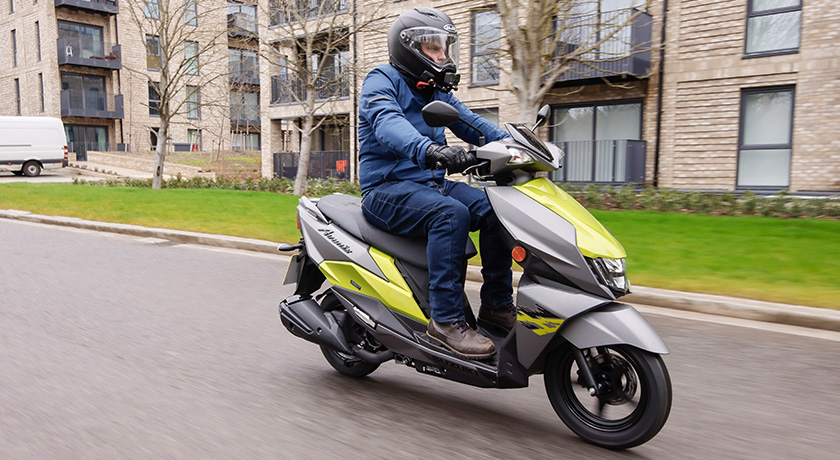
I think it is a fair assumption to make that for many of us we have to commute to the inner city to get to work every day, and being able to nip through the city traffic can definitely help to reduce the stress (and time) on our commute.
Instead of spending half of your morning in honking traffic, using your scooter to get to work means a much shorter journey time. In addition to this, did you know that scooters and motorcycles can legally travel in certain bus lanes? If the road sign for the bus lane features a motorcyclist, then you can pop into this lane on your bike to skip the queues*.
In addition to this, motorbikes and scooters are far smaller than a car and therefore contribute less to congestion. You’ll be pleased to know that if your motorcycle meets Euro 3 emissions and has been registered after July 2007, you should be exempt from both the Congestion Charge and T-Charge in London, meaning if you commute in the capital by bike you can save £12.50 a day (or more if you own an electric motorcycle or moped)! However, always make sure to run through the checker to confirm in advance.
*Please note that scooters and motorcycles are not permitted to ride in all bus and taxi lanes, please ensure you check the signage before you join a bus lane.
2. Riding a motorcycle is considered a good workout
Not only is riding a motorcycle great for your mental health, but it can also be a great and entertaining way of getting some exercise in!
Back in 2020, the Daily Express reported that riding a motorcycle can actually be considered a form of exercise, with you being able to burn anywhere up to 600 calories per hour.
They even go as far as to say that riding a motorcycle is just as good for you as seeing a chiropractor, with many riders experiencing fewer knee problems thanks to their leg muscles becoming stronger, as well as their neck muscles providing they wear the correct gear.
1. It is easy to get started - even from a young age
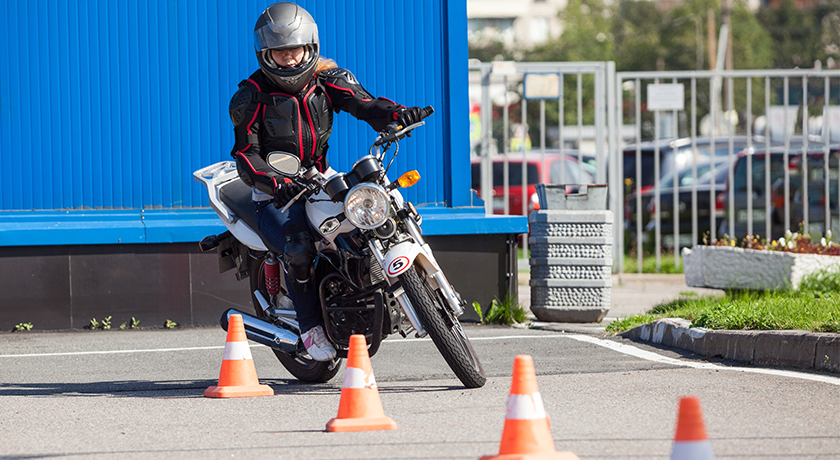
If you’re looking to get on the roads and ride, all you need is to be 16 years of age or older, have a provisional driving licence, and complete a compulsory basic training (CBT) course.
A CBT course can be completed in less than a day, and is designed to ensure that you can safely handle a moped on your own, lasting or 2 years - giving you a chance to practice for your full test. This is undeniably a lot less hassle than holding a provisional car licence, where you require an experienced driver in the car with you at all times.
After you’ve completed your CBT, you can ride a:
- Moped if you’re 16 or over
- Motorcycle up to 125cc and with a power output of up to 11kW if you’re 17 or over
The Last Stop!
So there you have it, I hope you enjoyed my rundown on just some of the benefits of switching your daily commuter to a two-wheeler!
One last thing to remember before we go - before committing to the two-wheel lifestyle, it’s important to have the correct training and insurance. If you are in need of motorbike insurance make sure to get a quote direct with Lexham!



